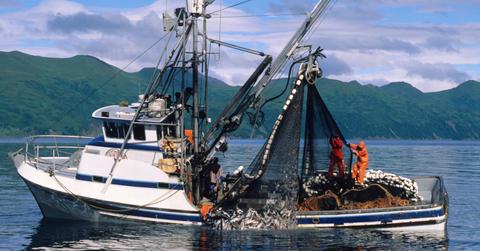Overheating Oceans and Overfishing Has Caused Fish Populations to Significantly Decline, Study Finds
We have the power to prevent a fishless ocean.
Updated March 1 2019, 5:54 p.m. ET

For more than a decade now, scientists have suspected that we could have fishless oceans by 2048. So it shouldn't come as a surprise that human-caused climate change has already caused our oceans to overheat and reduce the overall fish population. According to a new study, the world's fish population has depleted by 4.1 percent since 1930, primarily due to overheating oceans. Luckily, there are plenty of actions we as humans can take to prevent a fishless ocean from actually happening.
The study, titled "Impacts of historical warming on marine fisheries production," was published in the journal Science this week, and authored by several universities and fishery science centers. For the report, the authors studied the "maximum sustainable yield" of 235 different temperature-dependent populations of 124 fish species in 38 ecoregions, from 1930 to 2010.
The researchers found that about 4 percent of fish populations responded to warming oceans positively, but 8 percent of populations responded to the change negatively. They concluded that the "maximum sustainable yield" of the fish populations studied declined by 4.1 percent between 1930 and 2010. According to The Independent, some of the key fish populations to shrink include cod, herring, and certain shellfish.
While a variety of factors can cause the ocean's temperatures to rise, one of the biggest is overfishing. “Overfishing makes fisheries more vulnerable to warming, and continued warming will hinder efforts to rebuild overfished populations,” the study's lead author Chris Free told Carbon Brief. “Our results suggest that the overall effect has been a 4 percent loss in food provisioning potential around the world through to 2010. In some regions, like the East China Sea and North Sea, losses in food provisioning potential have been much higher, up to 15-35 percent.”
Free also explained to Carbon Brief that this data is only indicative of the sample studied, which represents about a third of "global catch," and not the world's entire fish population.
As reported by National Geographic, a 2006 study first came up with the statistic that we could have fishless oceans in 2048. The study blamed the declining fish populations on the loss of ocean biodiversity, which they believed to be a result of overfishing. As the study's authors wrote at the time, "Yet available data suggest that at this point, these trends are still reversible." If you're interested in reversing said trends, here are a few easy things you can do to prevent fish populations from further declining.
For one thing, you can learn more about how the fish you eat get from the ocean to your plate. When commercial fishers trawl (drag large nets across the ocean floor) for fish, they always bring in some "bycatch," including sea turtles, dolphins, whales, sharks, and more, according to One Green Planet. Additionally, those same sea animals sometimes get caught in dangling or discarded fishing nets, which can cause the animals to drown or starve, as explained by the World Wildlife Fund. In fact, the WWF added that fishing is the greatest cause of mortality for dolphins.
In 2014, Oceana published a report on bycatch, claiming that 17 to 22 percent of marine catch is discarded back into the ocean, though at that point they are often already dead or dying. So whenever people order wild-caught fish for dinner, they're not only responsible for that one fish's life, but the lives of many other sea animals.
If you don't want fish populations to continue declining, a great first step is to stop paying for people to take fish from the ocean and slaughter them. Luckily, plenty of brands make sustainable and ethical seafood alternatives. For example, Trader Joe's sells vegan crab cakes made of jackfruit, and Gardein makes fishless filets and crabless cakes.
Additionally, you can continue to reduce your individual environmental impact in your everyday life. The earth will thank you for things like eliminating meat and dairy, reducing your consumption of single-use plastic, and opting for eco-friendly forms of transportation. If enough people spend a little time on reducing their ecological footprints, we will be able to curb the effects of climate change — fishless oceans included.